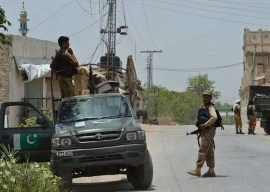
He is expected to become even more low profile in the post-president days, focusing on reorganizing the party. But some say that this job of re-organizing, which is very much needed, will also have to be done by remote control. After all, after leaving public office, Mr Zardari is supposed to stay out of politics for the next couple of years. But there is much to do. Most important is to train and put into place a political successor. Many are betting on Aseefa taking over. We will have to wait and see.
Love him or hate him, one can never underestimate President Zardari. He has drawn circles around both political opponents and allies, at times having them eat from the palm of his hand and at others forcing them into isolation before graciously welcoming them back into his camp.
A master manipulator, President Zardari’s biggest achievement was that he ensured that the party remained in power for its full term and as a corollary, democracy remained alive in Pakistan for this unprecedented period. A bigger achievement was that he graciously ensured that the election results in 2013 were accepted and that power was handed over without much delay.
In between, a lot was done that was less than desirable. The stigma of corruption in high places remained throughout the five years of the PPP government. But to be fair, the other stakeholders ensured that there was never a dull moment in the PPP days. One challenge after another was mounted against the government, at various levels.
Throughout his time as president, the media and the powers-that-be were unforgiving. His personal life was attacked. Insinuations were cast almost daily. Allegations, both true and false, were made with glee. Crusades were launched. But the president survived all this with a grin.
I recall on one occasion when Zardari sahib invited columnists to dinner, the same men who dissected the man from Nawabshah on a daily basis in their writings, fawned over him so that they could receive favours. And they did. By and large, the media remained untouched by Zardari throughout his tenure. Not a small achievement in a country where journalists are attacked frequently.
Politics was a different ball game, but one that the president played well. Allies were made of enemies, only so that law and order could be ensured. All major decisions, like the Swat operation and the drama that ensued beforehand, were endorsed by parliament. The pressure from allies was also handled well. Concessions were made. Compromises reached. Sometimes for the good of the country.
We saw the creation of Gilgit-Baltistan and reforms in FATA. The naming of Khyber-Pakhtunkhwa, a long-standing demand of the people of that province. The long awaited 18th Amendment as well as the Benazir Income Support Programme, with all its faults. But there were failures too, most notably the attempts to bring peace to Balochistan through the Aghaz-i-Haqooq-e- Balochistan programme.
We saw Memogate. We also saw Zulfiqar Mirza’s stellar performances that led us to nowhere. Then there were health issues that bogged down the president. And of course the growing law and order situation in which both the president and the government seemed helpless. The only protection they ensured was to protect themselves even more. The high walls around Bilawal House in Karachi, at great public expense and inconvenience, are a testament to this.
Relations between the pillars of state were testy. With the armed forces, we saw a relatively better working relationship. This also because of how external factors forced our hand.
On the party front, President Zardari seemed more predictable. He brought in his own loyalists and favourites, possibly one of the reasons why his party performed so poorly in the 2013 elections. For me, the biggest failure was, however, the fact that the killers of Benazir Bhutto could not be identified, let alone be brought to justice. This will remain the unfinished agenda of the Zardari government. You decide now how you want to remember the Zardari years.
Published in The Express Tribune, September 2nd, 2013.
Like Opinion & Editorial on Facebook, follow @ETOpEd on Twitter to receive all updates on all our daily pieces.
COMMENTS (9)
Comments are moderated and generally will be posted if they are on-topic and not abusive.
For more information, please see our Comments FAQ










































The credit must go to Mr. Zardari for sustaining democracy in whatever fragile form it remained. This is no mean achievement in a country which is prone to COUPs and many external factors trying to destabilize the government.
@Sodomite:
"He should have made Pakistan a truly law abiding state laying the infrastructure for growth that would have justified naming airports, hospitals and roads after his family. "
Looking at this comment, all I can say is, stop watching Bollywood films. Life is not nonsensical magic like Bollywood.
You want a major turn around in 5 years, in a totally failed state?!! You should simply make Bollywood styled fiction and watch it a 100 times.
Despite many of the shortcomings Zardari proved to be a better politician than previously thought.He achieved what no politician had done before him.And he wasn't shy to shed away his powers through the 18th amendment.He should be hailed for not answering the venom spewing opponents unlike many in the offices these days.
@Author
100% agree. Zardari did do well for the country. He is like the Sonia Gandhi of India. They both achieved nothing great. But did everything right. They both are underappreciated. Both inherited power through marriage.
Those who comment otherwise are the people who do not understand the realities of politics and governance.
@Sodomite:
"Zardari brought destitution to Pakistan when “the growth decade” was happening throughout the world."
The problem with Pakistanis is ignorance.
You think after 60 years of mismanagement, a man can turn a country in the path of growth in a a mere 5 years?
It's so easy to sell dreams to people like Sodomite. Any Zaid Hamid, any Imran Khan, any Sheikh Rashids can see you rubbish and you will be so eager to buy them.
A lot of the points discussed in this piece have very little to do with Zardari. For example, the writer makes it sound as if the 18th amendment was Zardari's brain child. In reality, the 18th amendment was going to come with or without Zardari as the political concensus behind was already there well before Zardari came to the presidency. You have to separate what happens because of an individual and what happens in his period because of circumstances that went well beyond the personality of an individual at the helm.
Biggest failure Mr. Editor does every one know who killed ZAB? Answer is yes. Do people know who killed BB, answer is yes but one may give every one of them little benefit of doubt. Option was either govern or go against killers! When PPP knew that, even BB who was more powerful than AZ could not go against killers of ZAB even though she wanted. There was only one option to be in chair ,other options was to be toppled and jailed hounded,as killers are the king makers in Pakistan. Biggest failure was mere helplessness.
LOL.
If Zardari's tenure was an innings played well then may God help us. May be the real problem is not with the politicians. It is with us who have lost all sense of good and bad and continue to refuse to tell as it is for political reasons. What a sorry state of affairs.
Zardari brought destitution to Pakistan when "the growth decade" was happening throughout the world. Democracy did not become stronger, he leaves it in a fragile state, made corruption fashionable, leaves the economy with little room to maneuver on social and education front. All state enterprises are bleeding at tax payers expense because of large scale looting and malfeasance. To consider surviving 5 years as an accolade is folly. He should have made Pakistan a truly law abiding state laying the infrastructure for growth that would have justified naming airports, hospitals and roads after his family.